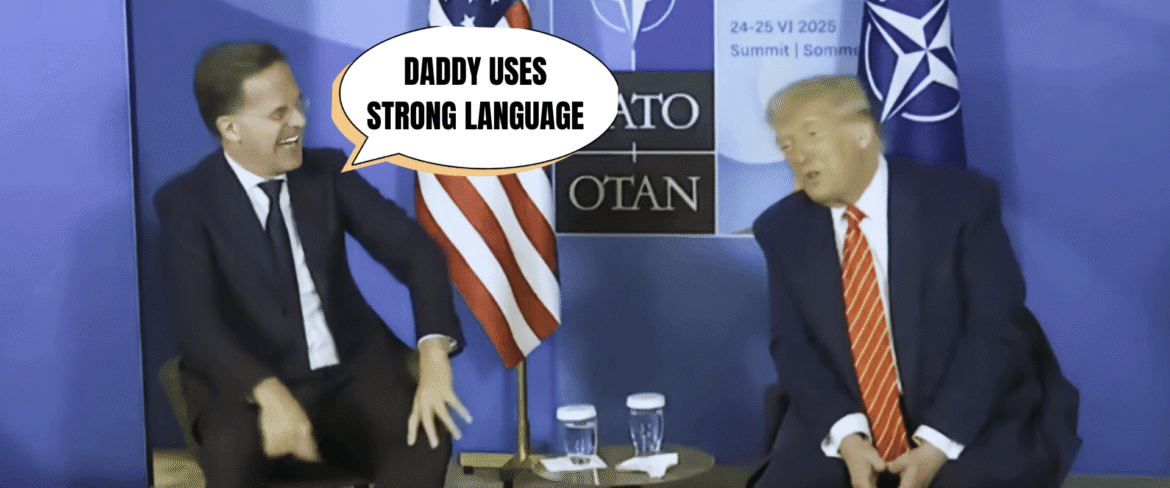- 1. The Viral Moment: What the NATO Chief Actually Said
- 2. Trump's Iran Strike: Restoring Fear and Respect
- 3. The Psychological Weight of Fatherhood in Global Politics
- 4. Why Nations Crave Stability from a Strong Leader
- 5. The Biden Vacuum vs. The Trump Anchor
- 6. God, Government, and Geopolitical Order
- 7. Conclusion: The World Still Needs a Rock
1. The Viral Moment: What the NATO Chief Actually Said
When the NATO Secretary General referred to President Trump as “daddy” in an off-the-cuff moment, much of the media laughed it off as a slip-up or an awkward attempt at flattery. But underneath that viral soundbite lies a deeper truth: even the world’s most elite diplomats are acknowledging something they haven’t seen in years—a man who commands fear, loyalty, and respect.
Trump’s own reaction only reinforced the dynamic. He smiled, took it in stride, and without missing a beat, leaned into the moment. The contrast between the laughter of the media class and the nods from foreign leaders tells the real story:
2. Trump’s Iran Strike: Restoring Fear and Respect
President Trump’s Midnight Hammer strike on Iran’s nuclear sites sent shockwaves not only through the Islamic Republic, but through the entire geopolitical system. While pundits at home debated legality or timing, NATO allies looked on and quietly nodded. For the first time in years, someone acted decisively. Someone proved they were willing to lead. And they succeeded.
3. The Psychological Weight of Fatherhood in Global Politics
In the human psyche, the role of “father” is more than biological. It represents order, authority, provision, and discipline. When that metaphor is projected onto global affairs, a nation that assumes the “father” role doesn’t merely dominate—it stabilizes. President Trump’s leadership invokes that archetype. His presence, whether you love him or hate him, changes the emotional temperature of the room. Like a father stepping into chaos, things start to settle.
4. Why Nations Crave Stability from a Strong Leader
The international system is not just a chessboard of interests—it’s a family of dysfunctions. Many nations, especially in Europe, have struggled with identity crises, economic stagnation, and leadership voids. When the U.S. acts with firmness, it gives those allies a reference point. Trump offers that psychological compass. It isn’t about dominance—it’s about direction.
5. The Biden Vacuum vs. The Trump Anchor
Under President Biden, the West has drifted. Allies are unsure, adversaries are emboldened, and global institutions lack a center of gravity. Trump’s reemergence brings back the sense of a geopolitical “north star.” NATO isn’t bowing in submission—they’re breathing a sigh of relief that someone is finally willing to take charge.
6. God, Government, and Geopolitical Order
While we ultimately look to God as the rock and cornerstone, the Lord often uses vessels on Earth to provide temporary stability. Scripture repeatedly shows how leaders can be used for divine purposes—both righteous kings and reluctant ones. In this geopolitical season, President Trump may be serving as one of those anchors in a stormy sea. Not as a messiah, but as a man with enough clarity, courage, and conviction to steady the ship.
7. Conclusion: The World Still Needs a Rock
The NATO chief didn’t just let a pet name slip. He said what many world leaders feel but can’t openly admit. In a time of confusion and collapse, the world needs a rock. And while that rock is ultimately Christ, on the political stage, America under Trump is once again fulfilling its role as the steadying force. Not just for our own people—but for the watching world.
